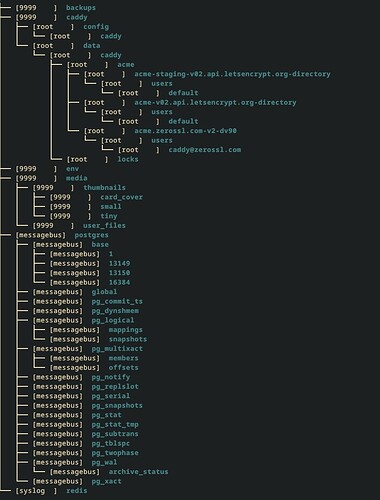I’m trying to install baserow using the “all in one” image for docker, using docker compose, and SWAG as my reverse proxy. I got confused with the docs - excellent though they are - and 'm not sure if I need to set any environment variables, and if so, which. So I’ve just copied the docker compose file from the baserow docs into my own, and cobbled up a configuration file for SWAG (nginx). But I can’t access my baserow site.
I hope I’ve provided enough information below!
Many thanks,
Alasdair
Technical Help Questionnaire
Have you read and followed the instructions at: *READ ME FIRST* Technical Help FAQs - #2 by nigel ?
Answer: Yes I have
Self-Hosted Installation and Setup Questions
How have you self-hosted Baserow.
Docker (version 25.0.1, build 29cf629) and docker compose (version v2.24.2). I’m currently hosting several services: a blog (woefully neglected), immich (photo magement), mealie (recipe management), portainer, adminer, kanboard, all protected with SWAG reverse proxy providing LTS certificates from letsencrypt.
What are the specs of the service or server you are using to host Baserow.
Host OS is Ubuntu 20.04LTS server edition (so without any graphics), simply managed with ssh.
The output of the free command is
total used free shared buff/cache available
Mem: 3838324 2178084 161788 173136 1498452 1199124
Swap: 488276 63232 425044
All this is running as a VPS with 105Gb of space, of which 63Gb is currently used.
Which version of Baserow are you using.
My docker compose file is pulling version 1.23.0
How have you configured your self-hosted installation?
Here is my docker compose file (site URL has been partially changed to include mysite.net):
version: "3"
networks:
adminer-network:
# proxy:
# external: true
services:
swag:
image: lscr.io/linuxserver/swag
container_name: swag
cap_add:
- NET_ADMIN
environment:
- PUID=1000
- PGID=1000
- TZ=Australia/Melbourne
- URL=mysite.net
- SUBDOMAINS=mealie,portainer,adminer,kanboard,immich,baserow
- VALIDATION=http
# - CERTPROVIDER= #optional
- DNSPLUGIN=cloudflare #optional
# - DUCKDNSTOKEN=<token> #optional
- EMAIL=redacted
- ONLY_SUBDOMAINS=false #optional
# - EXTRA_DOMAINS=<extradomains> #optional
# - STAGING=false #optional
volumes:
- /home/me/Docker/swag:/config
ports:
- 443:443
- 80:80 #optional
restart: unless-stopped
adminer:
image: adminer:latest
container_name: adminer
restart: unless-stopped # needed to restart service if it crash
environment:
- ADMINER_DEFAULT_SERVER=mariadb
ports:
- 8081:8080
# networks:
# - internal
# - proxy
depends_on:
- mariadb
networks:
- adminer-network
mariadb:
image: mariadb:10.5 # for sql server, prefer to fix version. upgrade can destroy your databases.
restart: always
environment:
- MYSQL_ROOT_PASSWORD=${MYSQL_ROOT_PASSWORD}
# networks:
# - internal
labels:
- traefik.enable=false
volumes:
- mariadb_data:/var/lib/mysql
networks:
- adminer-network
mealie:
image: ghcr.io/mealie-recipes/mealie:v1.1.0 #
container_name: mealie
ports:
- "9091:9000" #
deploy:
resources:
limits:
memory: 1000M #
volumes:
- mealie-data:/app/data/
environment:
# Set Backend ENV Variables Here
- ALLOW_SIGNUP=true
- PUID=1000
- PGID=1000
- TZ=Australia/Melbourne
- MAX_WORKERS=1
- WEB_CONCURRENCY=1
- BASE_URL=https://mealie.mysite.net
restart: always
portainer:
image: portainer/portainer-ce:latest
restart: always # needed to restart service if it crash
ports:
- 9443:9443
volumes:
- /etc/localtime:/etc/localtime:ro
- /var/run/docker.sock:/var/run/docker.sock:ro
- portainer_data:/data
blog:
image: nginx #blog:latest
container_name: blog
restart: unless-stopped # needed to restart service if it crash
volumes:
- /home/me/Docker/blog:/usr/share/nginx/html
immich-server:
container_name: immich_server
image: ghcr.io/immich-app/immich-server:${IMMICH_VERSION:-release}
command: [ "start.sh", "immich" ]
volumes:
- ${UPLOAD_LOCATION}:/usr/src/app/upload
- /etc/localtime:/etc/localtime:ro
env_file:
- .env
ports:
- 2283:3001
depends_on:
- redis
- database
restart: always
immich-microservices:
container_name: immich_microservices
image: ghcr.io/immich-app/immich-server:${IMMICH_VERSION:-release}
# extends:
# file: hwaccel.yml
# service: hwaccel
command: [ "start.sh", "microservices" ]
volumes:
- ${UPLOAD_LOCATION}:/usr/src/app/upload
- /etc/localtime:/etc/localtime:ro
env_file:
- .env
depends_on:
- redis
- database
restart: always
immich-machine-learning:
container_name: immich_machine_learning
image: ghcr.io/immich-app/immich-machine-learning:${IMMICH_VERSION:-release}
volumes:
- model-cache:/cache
env_file:
- .env
restart: always
redis:
container_name: immich_redis
image: redis:6.2-alpine@sha256:c5a607fb6e1bb15d32bbcf14db22787d19e428d59e31a5da67511b49bb0f1ccc
restart: always
database:
container_name: immich_postgres
image: tensorchord/pgvecto-rs:pg14-v0.1.11@sha256:0335a1a22f8c5dd1b697f14f079934f5152eaaa216c09b61e293be285491f8ee
env_file:
- .env
environment:
POSTGRES_PASSWORD: ${DB_PASSWORD}
POSTGRES_USER: ${DB_USERNAME}
POSTGRES_DB: ${DB_DATABASE_NAME}
volumes:
- pgdata:/var/lib/postgresql/data
restart: always
kanboard:
container_name: kanboard
image: kanboard/kanboard:latest
ports:
- "8080:80"
volumes:
- kanboard_data:/var/www/app/data
- kanboard_plugins:/var/www/app/plugins
# - kanboard_ssl:/etc/nginx/ssl
environment:
DATABASE_URL: mysql://kanboard:kanboard-secret@db/kanboard
PLUGIN_INSTALLER: true
db:
image: mariadb:latest
command: --default-authentication-plugin=mysql_native_password
environment:
MYSQL_ROOT_PASSWORD: secret
MYSQL_DATABASE: kanboard
MYSQL_USER: kanboard
MYSQL_PASSWORD: kanboard-secret
volumes:
- db:/var/lib/mysql
baserow:
container_name: baserow
image: baserow/baserow:1.23.0
environment:
BASEROW_PUBLIC_URL: 'https://baserow.mysite.net'
ports:
- "82:80"
# - "443:443"
volumes:
- /home/me/Docker/baserow_data:/baserow/data
volumes:
portainer_data:
kanboard_data:
driver: local
kanboard_plugins:
driver: local
db:
mariadb_data:
mealie-data:
driver: local
pgdata:
model-cache:
The configuration file for SWAG: baserow.subdomain.conf is:
server {
listen 443 ssl http2;
listen [::]:443 ssl http2;
server_name baserow.*;
include /config/nginx/ssl.conf;
client_max_body_size 0;
location / {
include /config/nginx/proxy.conf;
include /config/nginx/resolver.conf;
set $upstream_app baserow;
set $upstream_port 82;
set $upstream_proto http;
proxy_pass $upstream_proto://$upstream_app:$upstream_port;
}
}
This is similar to most of my other configuration files.
What commands if any did you use to start your Baserow server?
docker compose -f docker-compose.yml up -d
docker restart swag
Describe the problem
Simply, my site https.baserow.mysite.net is unreachable; attempts to access it result in an nginx 502 error.
Note that I have set up an ‘A’ site baserow.mysite.net with my domain name provider, so you can ping the site.
Provide screenshots or include share links showing:
How many rows in total do you have in your Baserow tables?
Note relevant at the moment, but the CSV files which contain the information have a toal of 5077 rows.
Please attach full logs from all of Baserow’s services
docker logs baserow produces 1468 lines … I have saved these to a file which I can send if you like.
